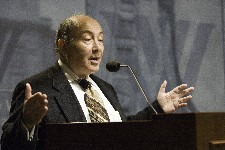AGOA, Five Years Later: Lessons Learned, Challenges Ahead
A half-day conference examining the legacy of the Africa Growth and Opportunity Act, and assessing ways to ensure that AGOA's potential is fully realized. Video of this event is available here.
Overview
Watch Conference videos and download related material by following the links at right
Hon. Mukhisa Kituyi, Minister of Trade and Industry, Kenya
Florizelle Liser, Assistant U.S. Trade Representative for Africa
Angela Ellard, House Ways and Means Trade Subcommittee
Stephen Lande, President, Manchester Trade
Anthony Carroll, Vice-President, Manchester Trade
Jack Edlow, President, Edlow International
Edward Kim Jaycox, Managing Director, Emerging Markets Partnership
Amb. Love Mtesa, Zambian Representative to the WTO
Gobind Nankani, World Bank Vice-President for Africa
Chairs: Howard Wolpe, Africa Program Director and Kent Hughes, STAGE Program Director, Wilson Center
Five years after the African Growth and Opportunity Act (AGOA) ushered in a new era of U.S.- Africa trade relations, the Wilson Center's Africa Program provided a forum for African and American private sector leaders and policymakers to assess AGOA's impact on African trade and economic development, and to examine what is required to ensure that the potential of AGOA is fully realized. Initiated by Congress in 1997 and first implemented by the Office of the US Trade Representative in 2000, AGOA aims to expand the access that African producers have to American markets by eliminating tariff and non-tariff export barriers on goods in the textile and apparel and agricultural sectors. Given that expanded market access without export capacity would have minimal impact on increasing Africa's trade relations with America, the Act also focused attention on the importance of increased institutional capacity-building in the public and private sectors of countries participating in AGOA.
In addition to a keynote address by Kenya's Minister for Trade and Industry, Hon. Mukhisa Kituyi, and a luncheon address by the World Bank's Vice President for Africa, Gobind Nankani, the conference consisted of two panels. The first panel, chaired by Florizelle Liser, the assistant US Trade Representative for Africa, evaluated AGOA's contribution to expanding U.S. market access for African export. It featured presentations by Angela Ellard of the House Ways and Means Subcommittee, Minister Kituyi, and Stephen Lande, the president of Manchester Trade.
 The second panel focused on maximizing AGOA's potential by strengthening the African capacity to export through continued investment in infrastructure and private sector development. This panel was chaired by Anthony Carroll, the vice president of Manchester Trade, and featured presentations by Ambassador Love Mtesa, Zambian Representative to the WTO; Edward Kim Jaycox, Managing Director, Emerging Markets Partnership; and Jack Edlow, president of Edlow International. The assessments undertaken by both panels were conducted against the backdrop of the pending Hong Kong meetings of the World Trade Organization's Doha "development" round in December of 2005; AGOA therefore was examined in the broader context of African economic development.
The second panel focused on maximizing AGOA's potential by strengthening the African capacity to export through continued investment in infrastructure and private sector development. This panel was chaired by Anthony Carroll, the vice president of Manchester Trade, and featured presentations by Ambassador Love Mtesa, Zambian Representative to the WTO; Edward Kim Jaycox, Managing Director, Emerging Markets Partnership; and Jack Edlow, president of Edlow International. The assessments undertaken by both panels were conducted against the backdrop of the pending Hong Kong meetings of the World Trade Organization's Doha "development" round in December of 2005; AGOA therefore was examined in the broader context of African economic development.
Panelists emphasized five critical points in their assessment of AGOA's impact over the past five years. First, although AGOA has been successful in increasing African exports to the United States, its intended impact in the textiles and apparel sector may be undermined by the phase-out of the quota system known as the Multifiber Arrangement (MFA) and its replacement by the Agreement on Textiles and Clothing (ATC). Stephen Lande noted some of the statistical highlights related to the implementation of AGOA: textile exports from Africa to the US increased three-fold; two-thirds of Africa's textile and apparel exports are sent to the United States; 200,000 jobs have been created in the textile and apparel sector since 2000. But despite these accomplishments, Africa's trade competitiveness in textiles and apparel are under increasing threat from China's cost advantage in production, particularly since the phase-out of the MFA and the introduction of "free-trade" in textiles and clothing through the ATC. An effective response to this issue will require diversification in the production of goods and services produced under AGOA, including the adoption of a value-added system such as that in Uganda, increased intraregional trade, and increasing trade with other developing countries outside of Africa.
Second, African agricultural exporters are having difficulty in meeting American animal and plant health standards, and so technical assistance is needed to build local institutional capacities to assist African producers in meeting certification requirements. Florizelle Liser noted that the USTR has sent technical specialists to three regional trade hubs on the continent to conduct training on U.S. health standards for imported agricultural and food products and certification methods. Without practical cooperation on sanitary and phyto-sanitary standards for commodities, African producers will continue to find health restrictions to be a major obstacle in exporting under AGOA.
Third, in order for the private sector to take advantage of the market access provided under AGOA, African governments must assume the role of facilitators, rather than simply regulators, of business. African governments should decrease their production costs by eliminating legal and policy barriers to trade, including non-tariff barriers, in order to promote a more hospitable business climate and indigenous investment. Kim Jaycox argued that good supportive macroeconomic policies that are private sector-friendly and that incorporate principles of corporate social responsibility would promote enterprise and attract the resources of the diaspora.
 Fourth, there is a serious need for improved economic infrastructure and long-term human capacity development in order to sustain private sector growth. Panelists agreed that in the absence of low-cost and efficient energy, and a sufficient transportation and communications infrastructure, there could not be any sustainable export growth. Kim Jaycox recommended that there should be American private sector-sponsored incentives for foreign direct investment (FDI) in infrastructure projects in Africa. Continued investment in education and health, especially in the prevention and treatment of HIV/AIDS, must match the human resource investment required by an expanding private sector. African managerial capacities can be more fully developed through international educational initiatives such as the Global Business School Network created by the International Finance Corporation.
Fourth, there is a serious need for improved economic infrastructure and long-term human capacity development in order to sustain private sector growth. Panelists agreed that in the absence of low-cost and efficient energy, and a sufficient transportation and communications infrastructure, there could not be any sustainable export growth. Kim Jaycox recommended that there should be American private sector-sponsored incentives for foreign direct investment (FDI) in infrastructure projects in Africa. Continued investment in education and health, especially in the prevention and treatment of HIV/AIDS, must match the human resource investment required by an expanding private sector. African managerial capacities can be more fully developed through international educational initiatives such as the Global Business School Network created by the International Finance Corporation.
Last, the December 2005 Hong Kong meetings of the WTO Doha "development" round provide an opportunity to pursue two important goals in international trade related to the effectiveness of AGOA: further expansion of market access and an increase in facilitative aid for export-oriented private sector development. The Hon. Mukhisa Kituyi argued that agricultural subsidies are undermining market access expansion and Ambassador Love Mtesa explained that a tariff-free and duty-free market access is of critical importance to African producers. Stephen Lande pointed out that the Doha "development" round must address the system of trade preferences that are, at this moment, inconsistent and discriminatory. Finally, a number of panelists suggested that aid and trade should not be viewed as separate approaches to development—they must be integrated so that aid becomes more facilitative of trade through direct financial support of private sector development and financial investment in human development.
- Partners
- We wish to acknowledge the generous support of the cosponsors of this event:
- -DaimlerChrysler
- -DATA
- -Manchester Trade
Marianna Ofosu and Mike Jobbins, ext. 4158
Howard Wolpe, Director
Hosted By

Africa Program
The Africa Program works to address the most critical issues facing Africa and US-Africa relations, build mutually beneficial US-Africa relations, and enhance knowledge and understanding about Africa in the United States. The Program achieves its mission through in-depth research and analyses, public discussion, working groups, and briefings that bring together policymakers, practitioners, and subject matter experts to analyze and offer practical options for tackling key challenges in Africa and in US-Africa relations. Read more
Thank you for your interest in this event. Please send any feedback or questions to our Events staff.










